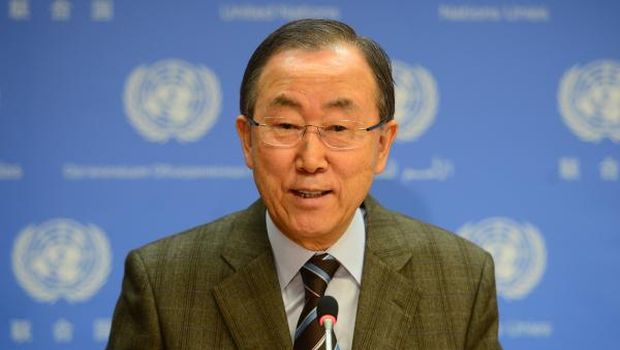
UN Secretary-General Ban Ki-moon makes an announcement at the United Nations headquarters in New York, January 19, 2014. (AFP Photo/Emmanuel Dunand)
London and Beirut, Asharq Al-Awsat—The Syrian Opposition Coalition (SOC) said on Monday that it would not attend the Geneva II peace talks on the Syrian conflict scheduled to begin in Switzerland this week unless UN Secretary-General Ban Ki-moon withdrew an invitation to Iran.
A spokesman for the group, Louay Safi, tweeted: “The Syrian Coalition announces that they will withdraw their attendance in G2 unless Ban Ki-moon retracts Iran’s invitation.”
The statement followed on the heels of the announcement from Ban Ki-moon that the Iranian government had accepted his invitation to take part in preliminary talks scheduled to begin on January 22 in Montreux, before face-to-face meetings between the representatives of the Syrian government and its opponents.
Reuters reported on Monday that France said Iran should not be allowed to attend the Syria peace talks in Switzerland if it does not accept the creation of a transitional government with full executive powers. The US and the UK also expressed reservations at Iran’s invitation, unless it agreed to the same precondition.
Russian foreign minister Sergei Lavrov told reporters that he backed the decision to invite Iran, calling it “responsible and principled.”
The absence of Iran at the conference would be an “unforgivable mistake,” he added.
The SOC held meetings late Sunday evening in Turkey to select a 15-member delegation to attend the talks after months of internal wrangling over the question of whether to attend the conference in the first place.
Ahmad Ramadan, a member of the political bureau of the SOC, told Asharq Al-Awsat that the team included two women, a representative of the Kurdish National Council (KNC), “one or two” members of the coordination committee, and three representatives of the Free Syrian Army (FSA) and the military brigades, as well as a number of diplomats and legal experts.
Sources at the Syrian National Council, one of the groups forming part of the SOC, said the delegation would not include controversial opposition figures like Manaf Tlass, a former Syrian army colonel and son of a former defense minister, Syria President Bashar Al-Assad’s uncle Rifaat Al-Assad, and the former Syrian deputy premier who was dismissed by Assad, Qadri Jamil.
The sources claimed that the inclusion of any of these people in the delegation would lead to the failure of the conference.
Meanwhile, Russian news agency Interfax quoted members of a Russian parliamentary delegation on a visit to Damascus as saying Assad would not give up power.
The news agency said Assad told the delegation that “if I wanted to give up power I would have done that from the start, and this issue is not open to discussion.”
However, the Syrian presidential media bureau has issued a statement on its Facebook page which said “all quotes attributed to the president by Interfax are inaccurate.”
Another Russian agency, ITAR-TASS, quoted Russian MP Alexander Yushchenko—part of the delegation which visited Syria—saying: “Assad suggested that his opponents nominate a candidate to compete with him in elections where the people decide, but they have not done that so far.”
Hisham Marwah, a member of the SOC, said the Russian news agency reports clearly represented Assad’s stance. He told Asharq Al-Awsat that “we do not expect his view to be any different and it is what Assad and other officials in his regime expressed repeatedly.”
Marwah added that “we are certain that he is not willing to give up power, and our decision to go to Geneva aims primarily at proving the opposition’s intention to achieve a political solution and expose the gamesmanship exercised by Assad since day one.”
The Islamist Front, which is a coalition of fighting Islamist forces, announced their rejection of the Geneva talks. Leading member Abu Omar, said on his twitter account that “Syria’s future will be decided here in the land of heroism, and will be scribed by blood in the fighting arenas, not at empty conferences attended by people who do not even represent themselves.”
Caroline Akoum contributed reporting from Beirut.
